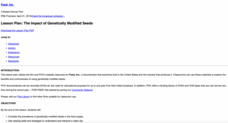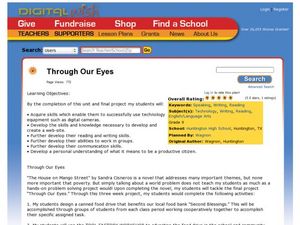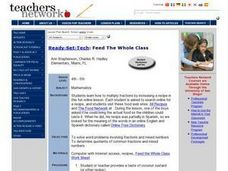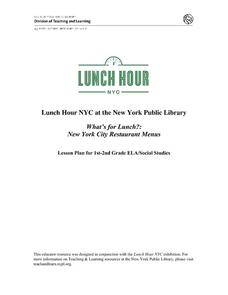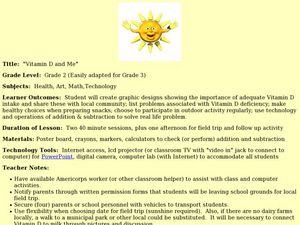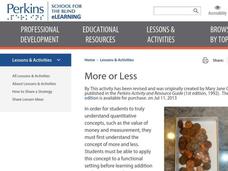Curated OER
A Simple Model for Natural Selection
Do you have what it takes to survive as a fit predator or will elusive prey lead to your extinction? Find out in a creative natural selection activity. Using different colors and shapes of grains to represent different species and...
PBS
U.S. Agricultural Subsidies and Nutrition
Most young people don't spend a lot of time thinking about why some foods cost less than others. This resource uses clips from the documentary, Food, Inc. to explore the impact of agricultural subsidies on nutrition, health, and the...
PBS
The Impact of Genetically Modified Seeds
What is all the fuss about genetically modified foods? PBS provides this resource designed to supplement the documentary Food, Inc. to help learners investigate the benefits and controversies of genetically modified foods...
Curated OER
Through Our Eyes
After reading Sandra Cisneros’ novel The House on Mango Street, class members design a canned food drive, create advertisements for the drive, and use digital cameras to document the entire process. In addition, pupils journal their...
Curated OER
Feed The Whole Class
Students solve word problems and determine quotients of fractions and mixed numbers. They practice multiplying fractions by increasing a recipe found on a food website. In addition, they increase the numbers to feed the whole class a...
Lesson This!
Fraction Fruit
Discover the concept of fractions by using fruit as a model. Scholars discover fractions are part of a whole, similar to the pieces of fruit which are placed in front of them. They then cut up several different types of fruit and discuss...
New York Public Library
What's for Lunch?: New York City Restaurant Menus
Do you remember the days when a cup of coffee cost five cents? At A.W. Dennett restaurant in 1894, you could buy a five-cent cup of coffee and as well as a five-cent slice of pie to accompany it. The menu from that year is a primary...
EngageNY
Complex Numbers and Transformations
Your learners combine their knowledge of real and imaginary numbers and matrices in an activity containing thirty lessons, two assessments (mid-module and end module), and their corresponding rubrics. Centered on complex numbers and...
Curated OER
Vitamin D and Me
Students create a graphic organizer showing the importance of Vitamin D intake. In this Vitamin D lesson, Students list problems with Vitamin D deficiency and create poster boards in small groups. Individually, students will create menus...
Curated OER
Cellular Respiration
Students are often confused by the huge amount of information and detail that can be learned about respiration. This is a great presentation summarizing the main 4 stages of cellular respiration. It is clear and uses diagrams and...
California Academy of Science
Plants: Hanging Tough
Learning about the rainforest can be more fun than you think. The class discusses vocabulary-in-context as they cut cardboard boxes, destined to become part of a rainforest model. Small groups of children color, cut, and construct...
California Education Partners
Cady's Cats
How much can a cat eat? The five-question fraction assessment asks pupils to determine the fractional portion of a food box eaten by cats. Learners show their proficiency in adding and subtracting fractions using several scenarios...
Curated OER
Stone Soup
Students examine the topics of conflict, resolution, and solution using the book "Stone Soup." They create a class pictograph using real vegetables brought in by the students, answer story comprehension questions, and sequence the events...
Royal BC Museum
Kids Page - Whales
Read about the physical features of whales and how they are grouped according to their method of eating food. A neat activity is described on the page; consider carrying this out in class. The resource makes a nice addition to a lesson...
Curated OER
George's Place
Here is another in the interesting series of lessons that uses money as a learning tool. This one is especially clever! During the lesson, pupils pretend they are eating at "George's Place" diner. Small groups are given one bag of play...
Perkins School for the Blind
More or Less
The concept of more or less is one that needs to be mastered prior to learning other concepts such as quantitative analysis, addition, or subtraction. This activity provides several ways to teach learners with low or no vision to...
DiscoverE
Ice Cream Special
We all scream for ice cream! Individuals create home-made ice cream in the classroom. This is a delicious way to show a real-world application of the freezing point depression to your class.
Ocean Explorer
Architects of the Coral Reef
Coral Reefs are the focus of a life science lesson plan. Upper graders look at how coral reefs are formed, how the animals and plants reproduce, and the variety of ways that humans benefit from coral reefs around the world. Groups of...
Curated OER
Eutrophication
Students observe the effects of eutrophication and determine why it is harmful to aquatic ecosystems. They create mason jar ecosystems to observe the growth of algae in pond water. In addition, they observe the effect of introducing...
Perkins School for the Blind
Bagging Groceries
Bagging groceries is a skill that can help learners with visual impairments understand organizing, problem solving, and weight discrimination. In addition, it is also a wonderful job skill. Help learners as they determine how to bag...
LABScI
Atomic Structure and the Periodic Table of Elements: The Secret Agent Lab
Food always gets attention! Model atomic structure using fruit loops to represent the subatomic particles. After building models, scholars create ionic bonds using their models. Finally, they use these concepts to create a periodic...
Curated OER
Oobleck
Here is a good lesson which aptly describes how to do the classic "Oobleck" lab with your young scientists. Unfortunately, the "Oobleck Investigation Sheet" in the plan doesn't open. However, this is a very clear description about how to...
Curated OER
Prairie Scavenger Hunt
Middle schoolers take a close look at the prairie environment. They identify common plants and animals of the prairie. In addition, pupils work in teams in order to put together a presentation on a certain aspect of the prairie...
Curated OER
The Seeds We Need
Learners apply word analysis skills to recognize new words, identify genres of fiction and nonfiction, and identify important themes and topics. They explore differences in plants, flowers, and vegetables. A book bag full of activities...


